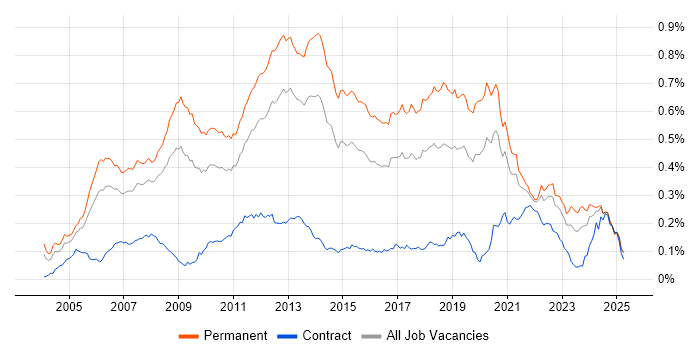C# Software Engineer
UK > UK excluding London
The median C# Software Engineer salary in the UK excluding London is £56,250 per year, according to job vacancies posted during the 6 months leading to 18 February 2026.
The table below compares current salary benchmarking and summary statistics with the previous two years.
|
|
6 months to
18 Feb 2026 |
Same period 2025 |
Same period 2024 |
| Rank |
456 |
440 |
525 |
| Rank change year-on-year |
-16 |
+85 |
+60 |
| Permanent jobs requiring a C# Software Engineer |
79 |
103 |
123 |
| As % of all permanent jobs in the UK excluding London |
0.16% |
0.32% |
0.25% |
| As % of the Job Titles category |
0.18% |
0.35% |
0.26% |
| Number of salaries quoted |
72 |
64 |
106 |
| 10th Percentile |
£47,750 |
- |
£32,500 |
| 25th Percentile |
£50,938 |
£40,000 |
£43,750 |
| Median annual salary (50th Percentile) |
£56,250 |
£52,750 |
£57,500 |
| Median % change year-on-year |
+6.64% |
-8.26% |
-13.67% |
| 75th Percentile |
£67,500 |
£69,500 |
£70,938 |
| 90th Percentile |
£80,000 |
£91,250 |
£81,250 |
| UK median annual salary |
£65,000 |
£55,000 |
£65,000 |
| % change year-on-year |
+18.18% |
-15.38% |
-14.75% |
For comparison with the information above, the following table provides summary statistics for all permanent IT job vacancies in the UK excluding London. Most job vacancies include a discernible job title that can be normalized. As such, the figures in the second row provide an indication of the number of permanent jobs in our overall sample.
| Permanent vacancies in the UK excluding London with a recognized job title |
44,049 |
29,556 |
47,666 |
| % of permanent jobs with a recognized job title |
91.20% |
91.48% |
95.01% |
| Number of salaries quoted |
27,551 |
14,399 |
36,952 |
| 10th Percentile |
£28,250 |
£31,250 |
£26,500 |
| 25th Percentile |
£35,000 |
£41,250 |
£35,000 |
| Median annual salary (50th Percentile) |
£50,000 |
£55,000 |
£50,000 |
| Median % change year-on-year |
-9.09% |
+10.00% |
-4.76% |
| 75th Percentile |
£65,000 |
£69,000 |
£65,000 |
| 90th Percentile |
£80,000 |
£82,966 |
£77,500 |
| UK median annual salary |
£55,000 |
£60,000 |
£55,000 |
| % change year-on-year |
-8.33% |
+9.09% |
-8.33% |
C# Software Engineer
Job Vacancy Trend in the UK excluding London
Historical trend showing the proportion of permanent IT job postings featuring 'C# Software Engineer' in the job title relative to all permanent IT jobs advertised in the UK excluding London.
C# Software Engineer
Salary Trend in the UK excluding London
Salary distribution trend for C# Software Engineer job vacancies in the UK excluding London.
C# Software Engineer
Salary Histogram in the UK excluding London
Salary distribution for jobs citing C# Software Engineer in the UK excluding London over the 6 months to 18 February 2026.
C# Software Engineer
Job Locations in the UK excluding London
The table below looks at the demand and provides a guide to the median salaries quoted in IT jobs citing C# Software Engineer within the UK excluding London region over the 6 months to 18 February 2026. The 'Rank Change' column provides an indication of the change in demand within each location based on the same 6 month period last year.
| Location |
Rank Change
on Same Period
Last Year |
Matching
Permanent
IT Job Ads |
Median Salary
Past 6 Months |
Median Salary
% Change
on Same Period
Last Year |
Live
Jobs |
| North of England |
-15 |
28 |
£55,000 |
-15.71% |
8 |
| South East |
+16 |
18 |
£52,500 |
-13.93% |
5 |
| South West |
+7 |
13 |
£60,000 |
- |
5 |
| Yorkshire |
-22 |
12 |
£45,000 |
-33.82% |
2 |
| East of England |
+15 |
11 |
£55,000 |
- |
6 |
| North West |
+6 |
10 |
£65,000 |
+15.56% |
5 |
| North East |
-6 |
6 |
£77,500 |
-3.13% |
1 |
| Midlands |
-6 |
4 |
£62,500 |
+38.89% |
1 |
| Scotland |
-18 |
4 |
£80,000 |
+100.00% |
8 |
| East Midlands |
-24 |
4 |
£62,500 |
+51.06% |
|
| Wales |
-1 |
1 |
£55,000 |
-8.33% |
|
C# Software Engineer
UK |
C# Software Engineer Skill Set
Top 30 Co-Occurring Skills & Capabilities in the UK excluding London
For the 6 months to 18 February 2026, C# Software Engineer job roles required the following skills and capabilities in order of popularity.
The figures indicate the absolute number of co-occurrences and as a proportion of all permanent job ads across the UK excluding London region featuring C# Software Engineer in the job title.
C# Software Engineer Skill Set
Co-Occurring Skills & Capabilities in the UK excluding London by Category
The following tables expand on the one above by listing co-occurrences grouped by category. They cover the same employment type, locality and period, with up to 20 co-occurrences shown in each category:


